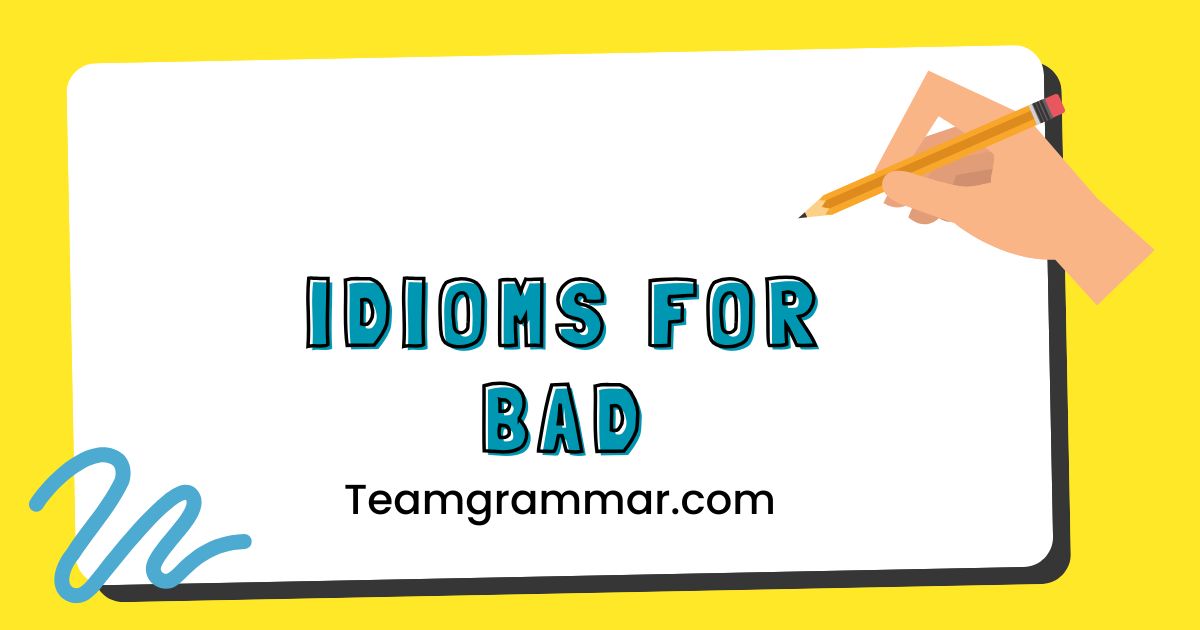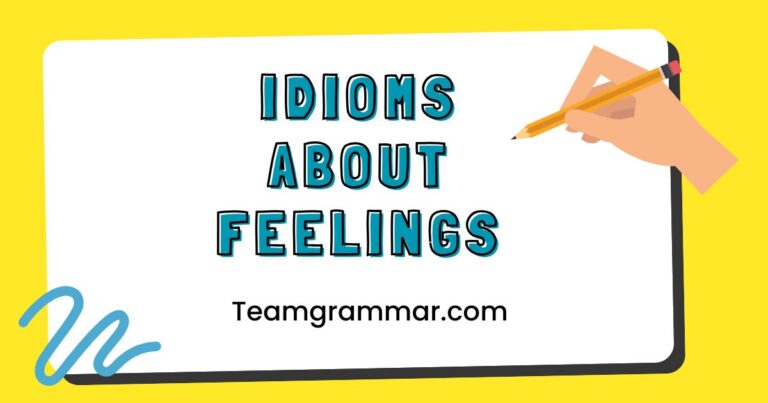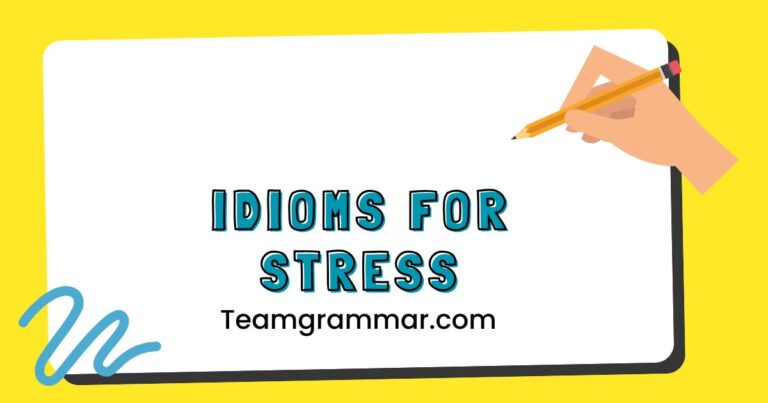35 Idioms for Bad : A Comprehensive Guide to English Expressions
Idioms add color and depth to the English language, allowing speakers to express nuanced meanings in a concise and engaging way. Mastering idioms related to the concept of “bad” is crucial for both understanding and effectively communicating negative situations, qualities, or outcomes.
This article provides a comprehensive exploration of idioms that convey the meaning of “bad,” offering definitions, examples, usage rules, and practice exercises to help learners of all levels enhance their English proficiency and cultural understanding. Whether you’re a beginner or an advanced learner, this guide will equip you with the knowledge and skills to confidently use these idioms in your everyday conversations and writing.
Table of Contents
- Introduction
- Definition of “Bad” Idioms
- Structural Breakdown of Idioms
- Types of “Bad” Idioms
- Examples of “Bad” Idioms
- Usage Rules for “Bad” Idioms
- Common Mistakes with “Bad” Idioms
- Practice Exercises
- Advanced Topics
- FAQ
- Conclusion
Definition of “Bad” Idioms
Idioms are expressions whose meanings cannot be understood from the literal definitions of the individual words they comprise. Instead, they carry a figurative or symbolic meaning that is culturally specific.
“Bad” idioms, therefore, are phrases that convey a negative sentiment or describe something undesirable, unfavorable, or of poor quality. These idioms can refer to a wide range of situations, behaviors, or characteristics, adding color and nuance to everyday language.
They are classified as phrasal verbs, metaphorical expressions, or proverbs, depending on their structure and origin. Their function is to provide a more vivid and relatable way to express negativity than simply using the word “bad” itself.
The context in which a “bad” idiom is used is crucial for understanding its intended meaning. For instance, the idiom “a bad egg” refers to a person with a questionable character, while “a bad hair day” describes a day when everything seems to go wrong.
Recognizing these contextual cues is essential for both comprehension and effective communication. Furthermore, the use of “bad” idioms varies across different English-speaking regions and social groups, reflecting the diverse cultural influences that shape language.
Therefore, exposure to a wide range of idioms and their corresponding contexts is key to mastering their usage.
Structural Breakdown of Idioms
Idioms, by their nature, defy straightforward structural analysis. They often consist of a combination of words that, when interpreted literally, make little sense.
However, understanding the typical patterns can be helpful. Many idioms arephrasal verbs, combining a verb with a preposition or adverb (e.g.,go south, meaning to deteriorate).
Others are metaphorical, using figurative language to represent a concept (e.g.,a can of worms, meaning a complicated problem). Still others resemble short proverbs or sayings, offering a concise expression of a common experience (e.g.,when it rains, it pours, meaning bad luck tends to come in bunches).
The key to understanding the structure of idioms lies in recognizing that their meaning is not compositional. That is, you cannot simply add up the meanings of the individual words to arrive at the idiom’s meaning.
Instead, the idiom functions as a single semantic unit. While some idioms may have a historical or etymological basis that sheds light on their origin, this knowledge is not necessary for understanding or using the idiom correctly.
The focus should be on learning the idiom as a whole and understanding its meaning within specific contexts. Furthermore, the grammatical structure of an idiom may sometimes be flexible, allowing for slight variations in word order or tense, while still preserving the idiom’s core meaning.
Types of “Bad” Idioms
Idioms expressing the concept of “bad” can be categorized based on the specific type of negativity they convey. These categories help to understand the nuances of each idiom and how they can be used in different contexts.
Idioms for Poor Quality
These idioms describe something that is substandard, defective, or not up to par. They often relate to products, services, or workmanship.
Idioms for Unpleasant Situations
These idioms describe circumstances that are undesirable, uncomfortable, or difficult to endure. They often relate to personal experiences, social interactions, or environmental conditions.
Idioms for Misbehavior
These idioms describe actions or behaviors that are inappropriate, unethical, or harmful. They often relate to personal conduct, social interactions, or professional ethics.
Idioms for Bad Luck
These idioms describe situations where someone experiences misfortune, adversity, or unfavorable outcomes. They often relate to chance events, unexpected circumstances, or external factors.
Idioms for Failure
These idioms describe situations where someone does not succeed in achieving a goal or objective. They often relate to personal efforts, professional endeavors, or overall outcomes.
Examples of “Bad” Idioms
This section provides a wide range of examples of “bad” idioms, categorized according to the types defined above. Each example is accompanied by a definition and a sentence illustrating its usage.
Examples for Poor Quality
The following table provides examples of idioms that describe poor quality. Each idiom is defined, and an example sentence is provided to illustrate its usage.
| Idiom | Definition | Example Sentence |
|---|---|---|
| Second-rate | Of poor quality; substandard. | The restaurant served second-rate food and the service was terrible. |
| A lemon | A defective or unsatisfactory product, especially a car. | I bought a used car last week, but it turned out to be a lemon. |
| Not worth a dime | Worthless; of little or no value. | His advice isn’t worth a dime; he’s always wrong. |
| Cheap and nasty | Poorly made and of low quality. | The furniture was cheap and nasty and fell apart within a year. |
| Shoddy workmanship | Poorly executed work; inferior craftsmanship. | The shoddy workmanship on the new house was evident in the crooked walls and leaky roof. |
| A rip-off | An overcharge; something that is not worth the price. | That souvenir shop is a rip-off; everything is overpriced. |
| Subpar | Below the expected standard. | The student’s performance on the exam was subpar. |
| Not up to scratch | Not good enough; below the required standard. | The team’s performance was not up to scratch in the final game. |
| A dog’s breakfast | A mess; something that is badly done. | The presentation was a dog’s breakfast; it was disorganized and confusing. |
| Half-baked | Poorly planned or thought out. | The company’s marketing strategy was half-baked and ineffective. |
| Tinpot | Small and unimportant, often used to describe a business or organization. | He runs a tinpot operation out of his garage. |
| Bush league | Unprofessional or amateurish. | The way they handled the customer complaint was bush league. |
| Janky | Of poor quality or unreliable. | That old car is really janky; I’m surprised it still runs. |
| Dodgy | Of questionable quality or reliability; potentially unsafe. | I wouldn’t trust that website; it looks a bit dodgy. |
| Patchy | Inconsistent or uneven in quality. | The internet connection is really patchy in this area. |
| Crude | Rough and unsophisticated. | The artwork was crude and lacked detail. |
| Flaky | Unreliable or prone to failure. | The software is really flaky; it crashes all the time. |
| Rundown | In poor condition; dilapidated. | The old building was rundown and in need of repair. |
| Tacky | In poor taste; gaudy. | The decorations were tacky and over the top. |
| Tatty | Old and in bad condition. | The furniture was old and tatty. |
| Wonky | Not straight or level; faulty. | The table is wonky and wobbles when you put something on it. |
| Flimsy | Weak and insubstantial. | The chair was flimsy and broke easily. |
| Rickety | In bad condition and likely to collapse. | The old bridge was rickety and unsafe. |
| Inferior | Lower in rank, status, or quality. | The product was of inferior quality compared to the original. |
Examples for Unpleasant Situations
This table showcases idioms that describe unpleasant situations, providing meanings and illustrative sentences.
| Idiom | Definition | Example Sentence |
|---|---|---|
| A nightmare | A very unpleasant or frightening experience. | The traffic jam was a complete nightmare. |
| A pain in the neck | Someone or something that is very annoying. | Dealing with the bureaucracy is a pain in the neck. |
| A thorn in one’s side | A persistent problem or annoyance. | That old debt is a thorn in my side. |
| A recipe for disaster | A situation that is likely to end badly. | Mixing alcohol and driving is a recipe for disaster. |
| Go south | To deteriorate or fail. | The project went south when the funding was cut. |
| Hit the fan | When trouble starts or a situation becomes public. | The truth will hit the fan when the investigation is complete. |
| In a pickle | In a difficult situation. | I’m in a pickle because I forgot my wallet at home. |
| On the rocks | Likely to fail or end. | Their relationship is on the rocks after the argument. |
| Up the creek without a paddle | In a difficult situation without the means to solve it. | If we run out of gas, we’ll be up the creek without a paddle. |
| Between a rock and a hard place | Faced with two equally difficult choices. | I’m between a rock and a hard place; I don’t want to quit my job, but I can’t stand my boss. |
| A dog’s life | A miserable existence. | He leads a dog’s life, working long hours for little pay. |
| A perfect storm | A combination of events that create a particularly bad situation. | The combination of the economic downturn and the pandemic created a perfect storm for small businesses. |
| A tight spot | A difficult or awkward situation. | I’m in a tight spot because I need to pay the bills, but I don’t have enough money. |
| A sticky wicket | A difficult or awkward situation (British English). | He’s in a sticky wicket after making that controversial statement. |
| All hell breaks loose | A situation of chaos and disorder erupts. | All hell broke loose when the fire alarm went off. |
| Go to pot | To deteriorate or decline. | Since the factory closed, the town has gone to pot. |
| Have a bad hair day | To have a day when everything goes wrong. | I’m having a bad hair day; everything seems to be going wrong. |
| In the soup | In trouble. | He’s in the soup for missing the deadline. |
| On the skids | Experiencing a decline or heading towards failure. | The company is on the skids after losing several major contracts. |
| Sink or swim | To succeed or fail based on one’s own efforts. | The new employees were thrown into the job and told to sink or swim. |
| The worst of both worlds | Having the disadvantages of two different situations without the advantages. | They ended up with the worst of both worlds: high costs and low quality. |
| Under the weather | Feeling unwell. | I’m feeling under the weather today, so I’m going to stay home. |
Examples for Misbehavior
Below is a table of idioms describing misbehavior, complete with definitions and example sentences.
| Idiom | Definition | Example Sentence |
|---|---|---|
| A bad egg | A dishonest or unreliable person. | He’s a bad egg; I wouldn’t trust him with anything. |
| Go astray | To go wrong or become corrupt. | The teenager went astray after falling in with the wrong crowd. |
| Out of line | Inappropriate or unacceptable behavior. | His comments were out of line and offended many people. |
| Step out of line | To behave inappropriately or disobey. | If you step out of line, you’ll face the consequences. |
| Cross the line | To do something that is considered unacceptable. | He crossed the line when he made personal attacks during the debate. |
| Get up to no good | To be doing something mischievous or wrong. | The children were getting up to no good while their parents were away. |
| Act up | To behave badly or misbehave. | The children started to act up when they got bored. |
| Play dirty | To behave unfairly or dishonestly. | The politician played dirty during the election campaign. |
| Bend the rules | To interpret or apply rules in a flexible way. | The manager bent the rules to help his friend get the job. |
| Skate on thin ice | To be in a risky or precarious situation. | He’s skating on thin ice after making so many mistakes. |
| A wolf in sheep’s clothing | Someone who appears harmless but is actually dangerous. | He seemed like a nice guy, but he turned out to be a wolf in sheep’s clothing. |
| Backstabber | Someone who betrays others behind their backs. | Watch out for him; he’s a backstabber who will do anything to get ahead. |
| Bad apple | One corrupt or dishonest member of a group. | The police department had a few bad apples who were ruining the reputation of the entire force. |
| Crooked | Dishonest or illegal. | The politician was known for his crooked dealings. |
| Double-cross | To betray or deceive someone. | He double-crossed his partner and ran off with the money. |
| Go rogue | To act independently and against the rules. | The agent went rogue and started his own investigation. |
| Lead someone astray | To tempt someone to do something wrong. | The older kids led the younger ones astray. |
| Mischief-maker | Someone who causes trouble or plays pranks. | The children were known as mischief-makers in the neighborhood. |
| Naughty | Badly behaved, especially children. | The children were being naughty and wouldn’t listen to their parents. |
| Sneaky | Acting in a secret and deceitful way. | He was being sneaky and trying to avoid getting caught. |
| Underhanded | Secret and dishonest. | His underhanded tactics gave him an unfair advantage. |
| Wicked | Evil or morally wrong. | The wicked witch cast a spell on the princess. |
Examples for Bad Luck
Here is a table of idioms related to bad luck, including their meanings and example sentences.
| Idiom | Definition | Example Sentence |
|---|---|---|
| Down on one’s luck | Experiencing a period of misfortune. | He’s been down on his luck since he lost his job. |
| When it rains, it pours | Bad things tend to happen together. | First, I lost my job, and then my car broke down; when it rains, it pours. |
| Born under a bad sign | Having a life marked by misfortune. | It seems like he was born under a bad sign; nothing ever goes right for him. |
| Bad karma | Negative energy or consequences resulting from past actions. | He must have bad karma because he always has bad luck. |
| Have a jinx | To have a spell of bad luck. | I think I have a jinx on me; everything I touch seems to go wrong. |
| Hard cheese | Tough luck (British English). | You missed the deadline? Hard cheese, you’ll have to try again next year. |
| Out of the frying pan into the fire | To go from a bad situation to a worse one. | He thought he was escaping his problems, but he went out of the frying pan into the fire. |
| That’s the breaks | That’s life; bad things happen sometimes. | You didn’t get the job? That’s the breaks, keep trying. |
| Tough cookie | A difficult or unfortunate situation. | Losing the game was a tough cookie, but we’ll come back stronger next time. |
Examples for Failure
The table below provides idioms that describe failure, along with their definitions and example sentences.
| Idiom | Definition | Example Sentence |
|---|---|---|
| Fall flat | To fail to produce the intended effect. | The joke fell flat and no one laughed. |
| Go belly up | To fail completely, especially financially. | The company went belly up after the recession. |
| Go down in flames | To fail spectacularly. | The project went down in flames when the deadline was missed. |
| Bomb | To fail completely. | The movie bombed at the box office. |
| Strike out | To fail to achieve something. | He struck out in his attempt to get a promotion. |
| Bite the dust | To fail or die. | The old computer finally bit the dust after ten years of use. |
| Come a cropper | To fail badly (British English). | The business came a cropper when the market crashed. |
| Draw a blank | To fail to remember something. | I drew a blank when the teacher asked me the question. |
| Flop | To be a complete failure. | The new restaurant was a flop and closed after only a few months. |
| Miss the boat | To miss an opportunity. | He missed the boat by not investing in the company when he had the chance. |
Usage Rules for “Bad” Idioms
The usage of idioms requires careful attention to context and audience. Here are some general rules to follow:
- Understand the meaning: Always ensure you fully understand the idiom’s meaning before using it. Misusing an idiom can lead to confusion or miscommunication.
- Consider the context: Idioms are often informal and may not be appropriate for formal settings. Consider your audience and the overall tone of the conversation or writing.
- Be aware of regional variations: Some idioms are specific to certain regions or dialects. Be mindful of your audience’s background and avoid using idioms that they may not understand.
- Avoid overusing idioms: While idioms can add color to your language, overusing them can make your speech sound unnatural or forced. Use them sparingly and only when they enhance your message.
- Pay attention to grammar: While idioms themselves are fixed expressions, they still need to fit grammatically within the sentence. Ensure that the verb tenses and other grammatical elements are correct.
Exceptions and special cases:Some idioms have variations in their wording or usage. For example, the idiom “a pain in the neck” can also be expressed as “a pain in the butt” or “a pain in the backside,” depending on the region and level of formality.
It’s important to be aware of these variations and use them appropriately.
Common Mistakes with “Bad” Idioms
One common mistake is taking idioms literally. For example, someone might misunderstand “go south” as referring to a physical direction rather than a decline in quality or condition.
Another mistake is using an idiom in an inappropriate context or with the wrong audience. Using very informal idioms in a formal presentation could be seen as unprofessional.
Here are some examples of common mistakes and their corrections:
| Incorrect | Correct | Explanation |
|---|---|---|
| “The project went to the south.” | “The project went south.” | “Go south” is an idiom meaning to fail, not a literal direction. |
| “He’s a pain in the mouth.” | “He’s a pain in the neck.” | The correct idiom is “a pain in the neck,” not “mouth.” |
| “It’s raining cats and dogs, literally!” | “It’s raining cats and dogs!” | The idiom is figurative and should not be taken literally. |
Practice Exercises
Test your understanding of “bad” idioms with these practice exercises. Choose the correct idiom to complete each sentence.
Exercise 1: Fill in the Blanks
| Question | Answer |
|---|---|
| 1. The company ____________ after losing its biggest client. | went belly up |
| 2. Dealing with that customer is always ____________. | a pain in the neck |
| 3. The politician’s reputation ____________ after the scandal. | went south |
| 4. The new product ____________ and nobody bought it. | fell flat |
| 5. He’s always ____________; I never trust him. | skating on thin ice |
| 6. I was ____________ when I forgot my keys. | up the creek without a paddle |
| 7. The team’s performance was ____________ in the last game. | not up to scratch |
| 8. He was ____________ for cheating on the test. | in the soup |
| 9. The movie ____________ at the box office. | bombed |
| 10. The old car finally ____________ after 20 years. | bit the dust |
Exercise 2: Multiple Choice
| Question | Answer |
|---|---|
| 1. Which idiom means “a situation likely to end badly”? a) A piece of cake b) A recipe for disaster c) A walk in the park |
b) A recipe for disaster |
| 2. Which idiom means “to miss an opportunity”? a) Hit the nail on the head b) Miss the boat c) Break a leg |
b) Miss the boat |
| 3. Which idiom means “to fail spectacularly”? a) Go down in flames b) Hit the jackpot c) Find your feet |
a) Go down in flames |
| 4. Which idiom means “a dishonest person”? a) A smart cookie b) A bad egg c) A couch potato |
b) A bad egg |
| 5. Which idiom means “to be in a difficult situation”? a) On top of the world b) In a pickle c) In the pink |
b) In a pickle |
| 6. Which idiom means “to behave inappropriately”? a) Step out of line b) Go with the flow c) Play it safe |
a) Step out of line |
| 7. Which idiom means “to deteriorate”? a) Go bananas b) Go south c) Go viral |
b) Go south |
| 8. Which idiom means “tough luck”? a) Easy peasy b) Hard cheese c) Piece of cake |
b) Hard cheese |
| 9. Which idiom means “worthless”? a) Worth its weight in gold b) Not worth a dime c) A diamond in the rough |
b) Not worth a dime |
| 10. Which idiom means “to be in a risky situation”? a) Skating on thin ice b) Walking on sunshine c) Sailing smoothly |
a) Skating on thin ice |
Advanced Topics
For advanced learners, exploring the etymology and historical context of idioms can provide a deeper understanding of their meaning and usage. Researching the origins of idioms can reveal fascinating insights into cultural history and linguistic evolution.
Additionally, analyzing how idioms are translated and adapted across different languages can further enhance your understanding of their cultural significance. For instance, some idioms may have direct equivalents in other languages, while others may require a more creative or interpretive translation.
Furthermore, advanced learners can explore the use of idioms in literature and other forms of creative writing. Authors often use idioms to add depth, humor, or authenticity to their narratives.
Analyzing how idioms are used in different literary genres and by different authors can provide valuable insights into the art of storytelling and the power of language.
FAQ
- What is the difference between an idiom and a proverb?
An idiom is a phrase whose meaning is not predictable from the usual meanings of its constituent elements. A proverb, on the other hand, is a short, well-known saying that expresses a general truth or piece of advice. While both are figurative expressions, proverbs typically offer wisdom or guidance, while idioms simply convey a specific meaning.
- Are idioms universal, or do they vary by culture?
Idioms are highly culture-specific. While some idioms may have equivalents in other languages, the vast majority are unique to a particular culture or language. This is because idioms often draw on cultural references, historical events, or shared experiences that are not universally known.
- How can I improve my understanding of idioms?
The best way to improve your understanding of idioms is through exposure and practice. Read widely, listen to native speakers, and pay attention to the context in which idioms are used. You can also use idiom dictionaries and online resources to learn new idioms and test your knowledge.
- Is it okay to use idioms in formal writing?
In general, it’s best to avoid using idioms in formal writing, as they can sound informal or colloquial. However, there may be exceptions depending on the specific context and audience. If you’re unsure, it’s always best to err on the side of caution and use more formal language.
- What should I do if I don’t understand an idiom?
If you encounter an idiom that you don’t understand, try to look it up in an idiom dictionary or online resource. If you still can’t figure it out, ask a native speaker for clarification. Pay attention to the context in which the idiom is used, as this can often provide clues to its meaning.
- Can I create my own idioms?
While it’s technically possible to create your own idioms, it’s unlikely that they will catch on unless they are widely adopted and used by others. Idioms typically evolve organically over time and become part of the shared language and culture of a particular group or community.
- How do I know when to use an idiom?
Use idioms when you want to add color, humor, or authenticity to your language. However, be mindful of your audience and the overall tone of the conversation or writing. Avoid using idioms that are too obscure or that may be misunderstood.
- Are some idioms more common than others?
Yes, some idioms are much more common than others. These are the idioms that you are most likely to encounter in everyday conversations and writing. It’s a good idea to focus on learning the most common idioms first, and then gradually expand your knowledge to include more obscure or specialized idioms.
- How can I remember the meanings of different idioms?
< - How can I remember the meanings of different idioms?
Use flashcards, create mnemonic devices, or use the idioms in your own sentences to help you remember their meanings. Regular practice and exposure are key to mastering idioms.
- Are there any idioms that should be avoided?
Avoid using idioms that are offensive, insensitive, or culturally inappropriate. Be mindful of your audience and the potential impact of your words. When in doubt, it’s best to choose more neutral language.
Conclusion
Mastering idioms related to the concept of “bad” is an essential step in achieving fluency and cultural competence in English. By understanding the nuances of these expressions, learners can communicate more effectively and appreciate the richness and diversity of the English language.
This comprehensive guide has provided a solid foundation for exploring and using “bad” idioms, equipping learners with the knowledge and skills to confidently navigate a wide range of communicative situations. Continued practice and exposure to authentic language will further enhance your proficiency and allow you to express yourself with greater precision and flair.







